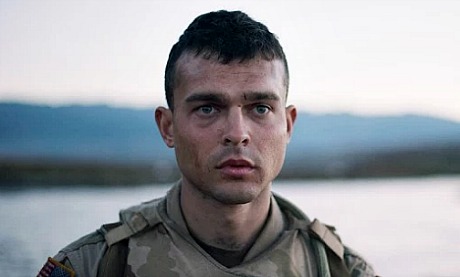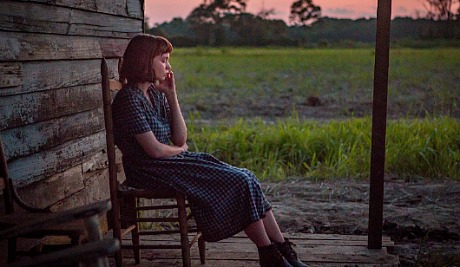I found Alexandre Moors‘ The Yellow Birds and Dee Rees‘ Mudbound to be more about endurance than absorption. They both made me feel trapped and conflicted as I sat there with my overcoat and scarf and cowboy hat scrunched under my seat, grappling with a downish realization that neither were cutting the mustard, much less ringing the bell.
I was obliged to stay, of course, because walking out (i.e., escaping) would be processed as ignoble and dilletantish by the Twitter dogs. And so I sat there in a state of numb submission, popping Tic Tacs and toughing it out, focusing on the fine performances by Mudbound‘s Carey Mulligan, Mary J. Blige and Jason Mitchell (at times almost good enough to redeem the film as a whole) and a pair of honorable turns by Yellow Birds‘ Jennifer Aniston and Toni Collette.
You know the drill — following along but waiting for something (anything!) truly interesting to happen, and checking your watch at 15-minute intervals.

Alden Ehrenreich as a PTSD-afflicted Iraq War veteran in Alexandre Moors’ The Yellow Birds.

Carey Mulligan in Dee Rees’ Mudbound.
Mudbound, a ’40s period piece about racial relations amid cotton farmers toiling in the hardscrabble South, bears more than a few resemblances to Robert Benton‘s Places In the Heart (’84). Likewise The Yellow Birds, an Iraq War-era drama about a search for the cause of a young American soldier’s mysterious death along with concurrent parental grief, is strongly reminiscent of Paul Haggis‘s In The Valley of Elah (’07).
In both cases the older films are far, far superior — better stories, more skillfully written, more emotionally affecting.
Based on Hillary Jordan‘s 2008 novel, Mudbound (adapted by TV writer-producer Virgil Williams) is about the relations between the white McAllans, owners of a shithole cotton farm (no plumbing or electricity) in the muddy Mississippi delta, and their black tenant-farmer neighbors, the Jacksons, in the immediate aftermath of World War II.
The McAllans are composed of paterfamilias Henry McAllan (a sullen, beefy-looking Jason Clarke), his city-bred wife Laura (Mulligan), their two kids, Henry’s racist dad (Jonathan Banks) and Henry’s younger brother, Jamie (Garrett Hedlund), who served as a bombardier during the war in Europe before returning home.
The Jackson principals are Hap (Rob Morgan), his wife Florence (Blige) and their oldest son Ronsel (Jason Mitchell), also a recently returned WWII veteran.
Jamie and Ronsel relate to each other because of their similar age, shared war experience and not being as tied to regional racial traditions, and Laura is obviously a more refined and compassionate person than her somewhat grunty husband. But the low-rent, under-educated delta atmosphere represses like a sonuvabitch, and from the moment the McAllans arrive you’re thinking “wait, I’m stuck in this hellish mudflat environment for the rest of the film?”
You’re also thinking “why has Mulligan decided to marry the pudgy, ape-like Clarke — she could obviously do better.”
Yes, Mudbound has a heart and a soul and a compassionate view of things. But my mantra as I watched it was “lemme outta here, lemme outta here, lemme outta here, lemme outta here, lemme outta here,” etc.
The Yellow Birds is about the investigation of the death of an Iraq War combatant named “Murph” (i.e., Daniel Murphy, played by Tye Sheridan), but more precisely about evasions and suppressions on the part of Murph’s PTSD-aflicted comrade, John Bartie (Alden Ehrenreich), when he returns home.
Murph’s mom Maureen (Aniston) naturally wants to know what happened, and Bartie’s mom Amy (Collette) is seriously concerned about her son’s totally withdrawn, zombie-like manner. There’s also a Sergeant Sterling (Jack Huston) with his own buried trauma issues, and a CID investigator (Jason Patric) with a persistent interest in what happened between Murph and John.
Where In The Valley of Elah had the great Tommy Lee Jones and Charlize Theron butting heads while looking into the stateside death of Jones’ son, The Yellow Birds mostly just wades into the frosty expressions and general lethargy of Ehrenreich’s Bartie — a guy I had zero interest in and didn’t want to hang out with.
The reason is Ehrenreich himself. He simply lacks that X-factor magnetism that popular lead actors all have. Charming as he was in Hail Caesar!, this beady-eyed fellow doesn’t have “it” — he’s always wearing the same sullen, hiding-out, stone-faced expression, no matter what kind of situation or character he’s playing. I’ll be seriously surprised if he turns out to be a great Han Solo as that Harrison Ford sexy-rogue quality just isn’t in him.
The Yellow Birds has moments of visual beauty but is otherwise disappointing — it doesn’t connect or sink in. And the ending is seriously weak tea.
After it ended I ran into a Los Angeles guy who runs a film series, and so I briefly shared my reservations about the film and Ehrenreich in particular. He said he liked The Yellow Birds and so did the people he was sitting with, and that Ehrenreich’s ability to reanimate Han Solo wasn’t an issue as far as Yellow Birds is concerned. I thought this film-series guy was someone I could talk to, and yet suddenly he was behaving like a typical Sundance goodviber, reluctant to be truly honest, searching for whatever upbeat impressions he could pass along.
The pop-out quote from our discussion was when he said to me that “if you’re only looking to hate, that’s all that’s going to happen whenever you see a new film.” In other words, my attitude is that of a glass-half-empty type of guy while he’s a committed believer in glasses half full. That remark told me everything.
Later I wrote this guy a note: ” Sorry if I seemed overly negative about Yellow Birds when we spoke earlier. I guess I was thrown by the fact that you were positive about a film that is so flat-out mediocre, so uninvolving, so mystifying, so boring in the final analysis. I didn’t realize that you’re basically committed to loving films as much as your heart allows. You’re very sharp and knowledgeable, but business-wise you’re one of those ‘wow, I love movies!’ guys. Mr. Alpha, Mr. Easy. This is your approach — I get it.”
